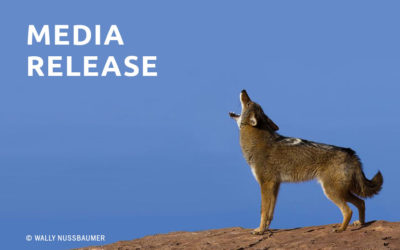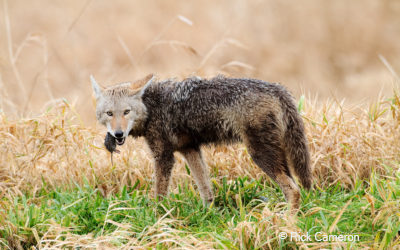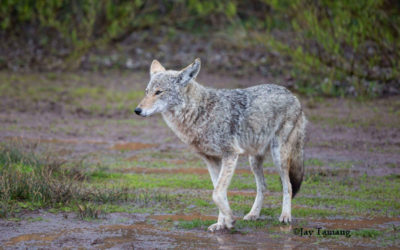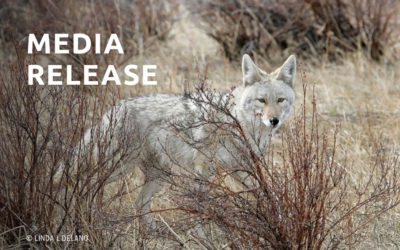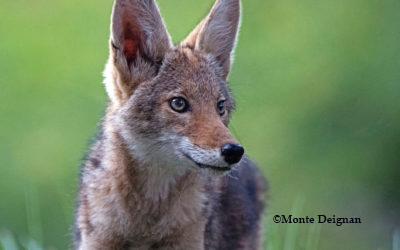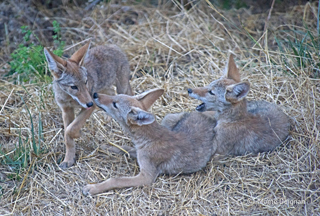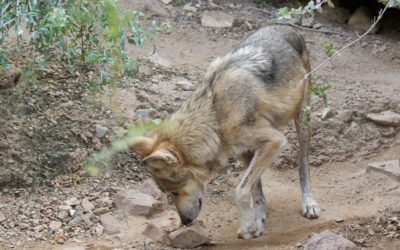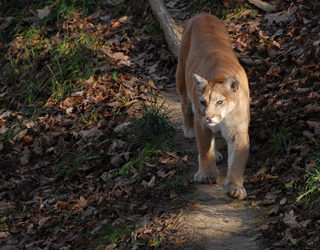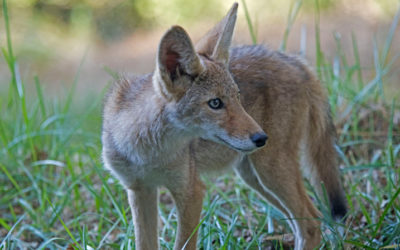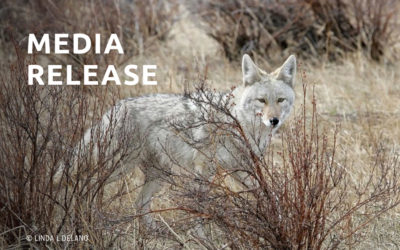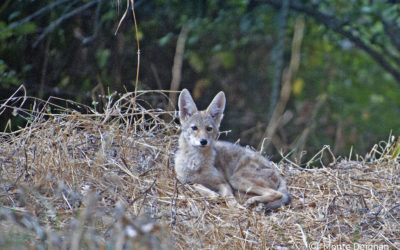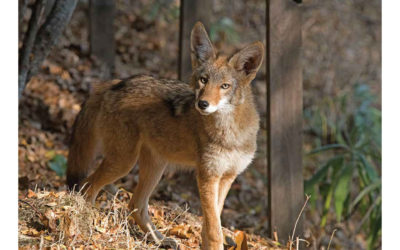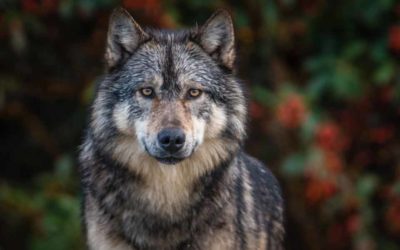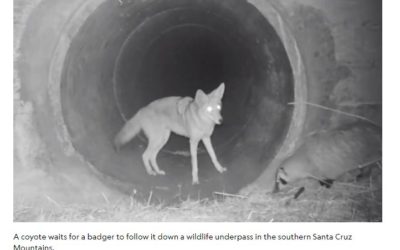Media Alert: Colorado becomes sixth U.S. state to outlaw cruel and unsporting wildlife killing contests
A coalition of leading wildlife protection organizations is applauding the Colorado Parks and Wildlife Commission for their vote today to ban wildlife killing contests for furbearer and certain small game species in the state. Colorado is now the sixth state in the country to ban these cruel events. The proposal, advanced by Colorado Parks and Wildlife staff and approved today by the Colorado Parks and Wildlife Commission, prohibits killing contests that target species including mink, pine marten, badger, red fox, gray fox, swift fox, striped skunk, western spotted skunk, beaver, muskrat, long-tailed weasel, short-tailed weasel, coyote, bobcat, opossum, ring-tailed cat, raccoon, as well as Wyoming ground squirrel. Species also include white-tailed, black-tailed and Gunnison’s prairie dogs.
Letters: Taxpayers should not pay for lethal wildlife option
A key piece of information is missing from the March 7, front page article in the Ukiah Daily Journal entitled “Non-lethal Wildlife Option Explored.” It’s laudable that the Board of Supervisors is investigating non-lethal means when it comes to wildlife/human conflicts. But the Board’s current proposal is to have taxpayers continue to foot the $170,000 bill for the County to contract with USDA Wildlife Services to kill thousands of wild animals annually, using neck snares and other brutal killing methods that have been proven to be wildly ineffective and even counterproductive in protecting livestock.
The real reason we’re seeing more wildlife during the pandemic
As the world has slowed down to stave off the spread of COVID-19, stories of wild animals tromping into now-quiet city streets have gone viral online. Some of these turned out to be completely made-up, including the dolphins supposedly swimming through Venice canals or the elephants getting drunk on corn wine in a Chinese farming village.
VIDEO: Watch as Coyotes Roam the Empty Streets of San Francisco
Shelter-in-place orders do not apply to wildlife, and in San Francisco, coyotes are making themselves comfortable out and about. With little to no people around, the coyotes have free rein and can explore areas they might not otherwise get to. The animals are experiencing greater freedom in the city than its people.
California Court Approves Ban on Federal Wildlife Poisoning, Trapping
SAN FRANCISCO, CA — In response to a lawsuit filed by wildlife advocacy groups, a federal animal-killing program must restrict its use of bird-killing poisons in Northern California and stop setting strangulation snares and other traps in places like the Sacramento National Wildlife Refuge Complex.
A message from Peter Coyote ~ Generosity and Gratitude
My dear friend - Project Coyote’s Founder and Executive Director - Camilla Fox marks her birthday on March 31st. I write to you today to ask that you join me in honoring her for her tireless spirit and leadership shepherding Project Coyote’s message of co-existence....
Wildlife killing contests have no place in Pennsylvania
In January and February, some of the largest wildlife killing contests in the nation occurred in Pennsylvania, with at least 27 of these “predator hunts” this winter alone. Annually, tens of thousands of hunters take to Pennsylvania forests to kill and trap coyotes — the keystone predator of the Keystone State. Killing-contest prize money attracts more contest participants than any other furbearer event in the state.
Dr. Michael Fox: Killing Coyotes Does Not Regulate Their Numbers
State and federal agents have used traps, snares, denning, fishhooks, dogs, cyanide guns and poison bait for decades, but the coyotes have continued to colonize region after region, state after state. You are witnessing evolution: These predators are adapting to conditions we humans have made favorable for them and their prey, including free-roaming cats (who should be indoors) and unattended dogs. Coyotes will also kill white-tailed deer fawns, the overabundance of which we humans have created for the hunting industry and by the virtual extermination of the wolf. Through competitive exclusion, wolf packs once limited the spread of coyotes.
Feds Agree to Moratorium on Poison, Traps to Control Idaho Wolves
Conservation groups and the Trump administration have reached a settlement that will sharply limit where and how federal agencies can kill wolves in Idaho. Filed Wednesday in Idaho federal court, the settlement comes after the Western Watersheds Project, Center for Biological Diversity and others challenged the environmental impact statement issued by the U.S. Department of Agriculture’s Wildlife Services regarding efforts to control gray wolf activity in Idaho. After a series of appeals and legal battles, the two parties have reached an agreement on how the killing of wolves can be managed moving forward in the Gem State.
Mendocino County exploring non-lethal wildlife management service
The Mendocino County Board of Supervisors has authorized the Wildlife Ad Hoc Committee, consisting of Supervisors Dan Gjerde and John Haschak, to work with county staff to bring back options for a strictly non-lethal wildlife management service in Mendocino County. The non-lethal service would be a supplemental option to the recently approved Integrated Wildlife Damage Management Program, which has lethal options for killing animals. The organization called A Wildlife Exclusion Service, which was created by Sonoma County Wildlife Rescue, would likely provide the non-lethal animal program services.
Evidence Does Not Support Hunting As A Way To Control Cougars: Study
Most Western states rely on hunters to keep cougar numbers in check. It makes a sort of logical sense: if cougar populations are high, attacks on elk, bighorn sheep and deer should be high. So should attacks on livestock and humans. But a new study casts doubt on the effectiveness of sport hunting as a means of predator control.
Friendly, black coyote captured in East Cobb
For a week, Vanessa Prior’s Great Pyrenees named Ruth Bader has had a friend–a black coyote that researchers have been tracking since late December when it was first spotted in Smyrna.
It ended up in Prior’s backyard in East Cobb, where for a week it would show up every morning to play with Ruth Bader.
Groups to Host Screening of Documentary Film that Exposes the Shadowy World of Wildlife Killing Contests
DENVER, CO – The Institute for Human-Animal Connection, Sturm College of Law, and DU Media, Film & Journalism Studies, in partnership with Project Coyote, will host Banning Wildlife Killing Contests in Colorado on Wednesday, Feb. 26, at the University of Denver. This free event will raise awareness about wildlife killing contests in Colorado — where participants compete to kill wild animals, including coyotes and prairie dogs, for entertainment and prizes.
Opinion: It’s time to ban wildlife killing contests in Colorado
The photographs are disarming: dozens of coyotes, their fur smeared with blood, strewn across the ground while grown men and sometimes children stand over them, proudly grinning from ear to ear. This is a familiar scene at wildlife killing contests, a little-known bloodsport rarely glimpsed by the general public.
Washington Fish and Wildlife commission considers ban on hunting competitions
Washington state wildlife managers are considering eliminating hunting competitions, particularly of coyotes, citing ethical and social concerns. “Sometimes we have to do something for social reasons and this is one of them, in my mind,” said Barbara Baker, the Thurston County commissioner who requested the commission consider the changes. “This is the kind of thing that gives hunters a bad name.”
An endangered wolf wandered 8,712 miles to find a mate. Her journey ended in tragedy.
She was first captured in 2017. That October, biologists in Oregon trapped, tranquilized and collared an 83-pound female gray wolf. They hoped to track the endangered animal’s movements, marking the start of a well-chronicled saga for the lonely wolf that ended this week. The young canine, named OR-54, was found dead Wednesday in California.
Why this coyote and badger ‘friendship’ has excited scientists
Like a page out of a child’s storybook, a coyote and a badger trot side by side, seemingly the best of friends. The remote camera video clip was captured recently under a busy highway in California’s Santa Cruz Mountains. It’s gone viral on Twitter, showing just how much people love to cheer on unusual animal bonds.
Wildlife Conservation Organizations Sue Mendocino County Challenging WS Killing Program
UKIAH, CA – Two wildlife conservation organizations filed suit today against Mendocino County. The suit challenges the County’s certification of its Final Environmental Impact Report (FEIR) on its wildlife management program. It further seeks to reverse a controversial decision by the Mendocino County Board of Supervisors to renew its contract with USDA Wildlife Services (WS) for killing wildlife in the county.

